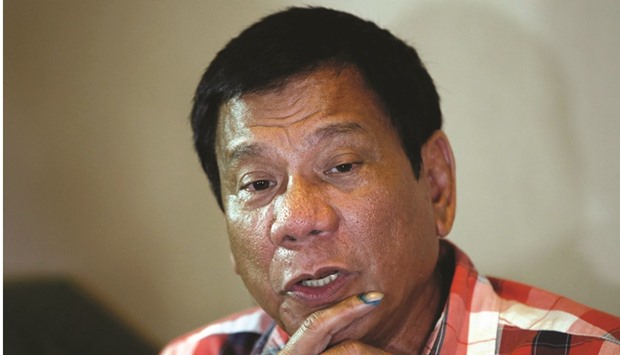The Philippines’ president-elect, rough-talking city mayor Rodrigo Duterte, yesterday announced plans for an overhaul of the country’s system of government that would devolve power from “imperial Manila” to long-neglected provinces.
Duterte’s win in Monday’s poll has not been confirmed, but an unofficial count of votes by an election commission-accredited watchdog showed he had a huge lead over his two closest rivals, both of whom conceded defeat.
By yesterday afternoon, the ballot count showed Duterte had almost 39% of votes cast. He was more than 6mn votes ahead of the second-placed candidate with 92% of votes counted from an electorate of 54mn.
It is not clear when Duterte’s victory will be officially declared but he is expected to take office on June 30.
Votes were also cast on Monday for vice-president. One day on, counting showed the outgoing administration’s candidate, Maria Leonor Robredo, ahead of the son and namesake of late dictator Ferdinand Marcos.
Duterte’s spokesman, Peter Lavina, told a news conference that the new president would seek a national consensus for a revision of the constitution which would switch from a unitary form of government to a parliamentary and federal model.
The proposal to devolve power from Manila fits with Duterte’s challenge as a political outsider to the country’s establishment, which he has slammed as self-serving and corrupt.
“The powerful elites in Manila who will be affected by this system will definitely oppose this proposal,” said Earl Parreno, an analyst at the Institute for Political and Electoral Reforms.
Duterte’s spokesman said he would also seek peace agreements with rebel groups in the south of the archipelago, where the outgoing government has been using force to quell militancy.
The 71-year-old’s truculent defiance of political tradition has drawn comparisons with US Republican presidential candidate Donald Trump, as have his references to his libido.
That tapped into popular disgust with the ruling class over its failure to reduce poverty and inequality despite several years of robust economic growth.
Duterte’s vows to restore law and order also resonated with voters. But his incendiary rhetoric and advocacy of extrajudicial killings to stamp out crime and drugs have alarmed many who hear echoes of the country’s authoritarian past.
The US said it would work with the new leader of the Philippines but declined to say if it had any concerns about the controversial policies advocated by him
“Washington respects the choice of the Philippine people. We gladly work with the leaders they’ve selected,” State Department spokeswoman Elizabeth Trudeau said in Washington without identifying Duterte by name.
When pressed about whether the US had any concerns about positions advocated by Duterte, including extrajudicial killings to stamp out crimes and drugs, Trudeau repeated her statement that Washington respected the choice of the voters.
“We look forward to working with the leader that the Philippines has elected,” she said.

Duterte: expected to take office on June 30.
